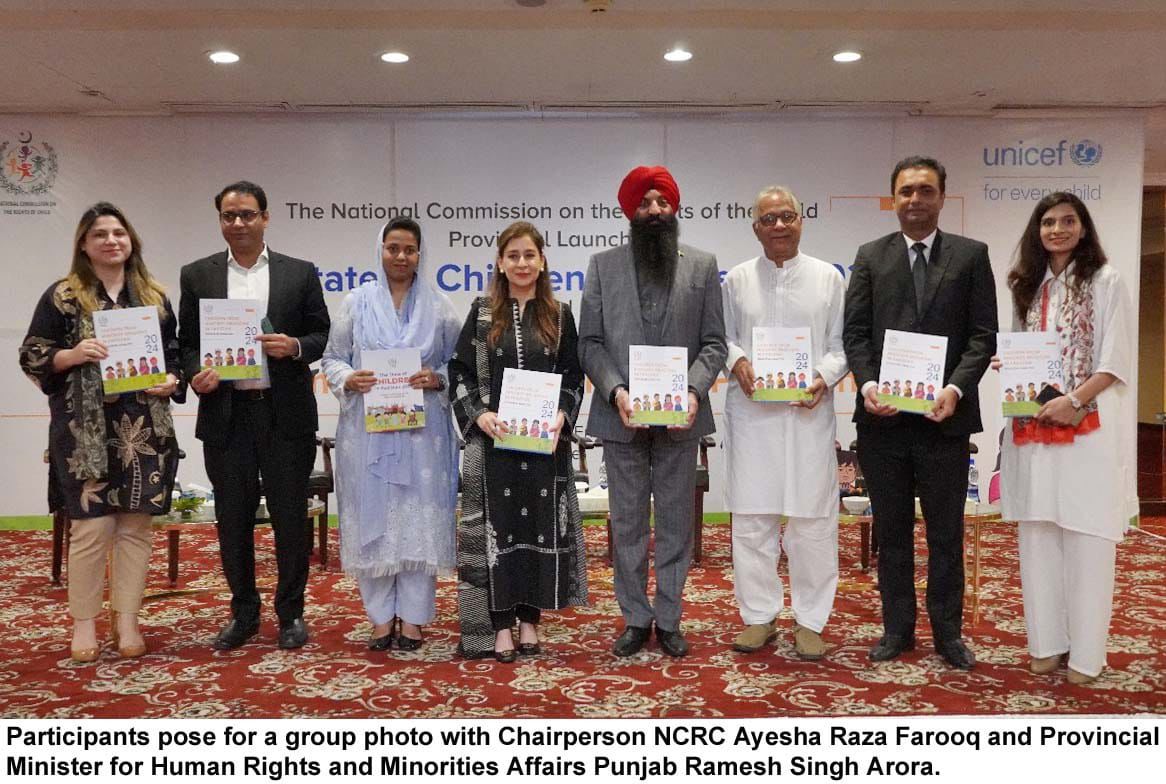Staff Report
LAHORE: The National Commission on the Rights of Child (NCRC) launched two publications: the “State of Children in Pakistan 2024” and the “Situation Analysis of Children from Minority Religions in Pakistan.” The launch event brought together provincial government representatives, human rights defenders, academics, police officials, civil society leaders, and development partners to collectively examine the systemic challenges facing children in Pakistan, especially those from religious minority backgrounds.
Ms. Ayesha Raza Farooq, Chairperson NCRC welcomed the participants and emphasized the Commission’s mandate to serve as an independent watchdog focused on protecting and promoting rights of children across Pakistan. She said “Both these reports being launched today are aligned with our mandate—to generate evidence, identify policy gaps, and guide duty-bearers toward systemic and sustainable solutions. While there has been measurable progress—such as improved birth registration and legal reform in certain provinces—millions of children in Pakistan still fall through the cracks due to fragmented efforts, lack of coordination, and limited political will. The Commission is working closely with governments to harmonize child protection laws, raise the age of marriage to 18, ensure inclusive education, and strengthen systems that safeguard all children—especially those from minority communities. But we cannot do this alone. I urge every stakeholder—policymakers, educators, law enforcers, civil society, and faith leaders—to move beyond silos and act in unison. Every child, regardless of religion or background, deserves dignity, safety, and a fair chance at life.”
Dr. Mehek Naeem, Member Punjab-NCRC presented the key findings of the State of Children in Pakistan 2024 report. The report provides a comprehensive review of the status of children’s rights in the country. It highlights critical issues such as child labor, child marriage, education gaps, juvenile justice, and violence against children. With a province-wise breakdown of indicators and policy analysis, the report serves as a vital resource for legislators, child protection institutions, and rights-based organizations.
“In Punjab alone, we continue to see glaring inequalities in child health, access to quality education, and legal protection. This report helps us identify where interventions are needed most—and how we can ensure that no child is left behind.” stated Ms. Mehek Naeem.
Following this, Mr. Pirbhu Lal Satyani, NCRC Member Sindh/Minorities introduced the second report titled Situation Analysis of Children from Minority Religions in Pakistan. This study investigates the layered vulnerabilities experienced by children belonging to religious minorities—including barriers to education, incidents of forced conversion, child labor, and discrimination in public services.
Mr. Satyani said “Children form religious minority are among the most marginalized. They face stigma, stereotyping, and structural exclusion that obstruct their full development. This report is a call to action—for both policy and society—to ensure their inclusion, dignity, and protection.”
A dynamic panel discussion followed, featuring insights from leading experts across diverse sectors. Mr. Peter Jacob spoke on the alarming rise in forced conversions and the urgent need for protective legislation. Dr. Tahir Kamran emphasized the historical marginalization of religious minorities and highlighted the deep-rooted biases within the curriculum. Ms. Baela Jameel stressed the critical need for inclusive and responsive reforms in the education sector.
Advocate Miqdad Naqvi addressed legal loopholes and enforcement gaps related to forced conversions, underlining the importance of equipping law enforcement with the necessary tools and sensitivity. Ms. Mary James Gill drew attention to the plight of minority children involved in sanitation work, calling it a form of systemic discrimination that deprives children of dignity and opportunity. Meanwhile, Mr. Mustansir Feroze, CEO of Punjab Safe Cities Authority, introduced the Misaq Minorities Centers, elaborating on the services being provided to enhance safety, accessibility, and support for marginalized communities.
The event concluded with Mr. Ramesh Singh Arora, Provincial Minister for Human Rights and Minorities Affairs Punjab, delivering closing remarks. He reaffirmed the government’s commitment to upholding the rights of children from all communities.
“Punjab is taking concrete steps to ensure that every child—Muslim, Christian, Hindu, Sikh, or from any faith—has equal access to education, protection, and justice. The reports launched today provide us with the data and direction we need to move forward with clarity and resolve,” he said.

